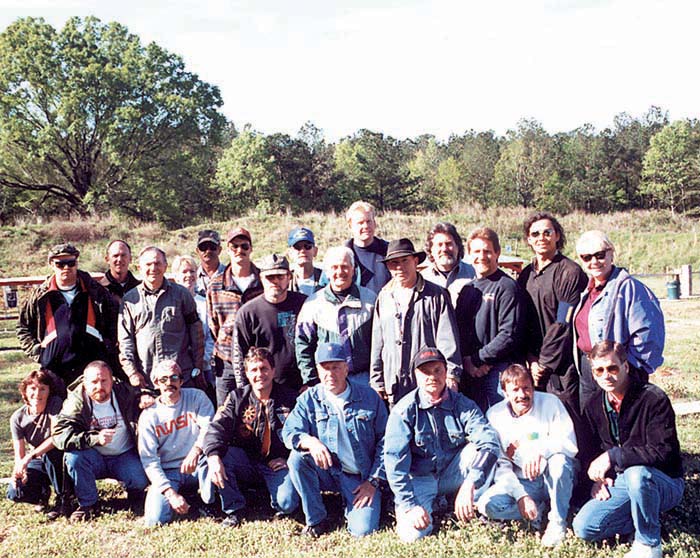The Chute & Shoot 2000 competitors and spouses.
By Clyde H. Morgan
Had we jumped in February, 1864, we would have seen General William Tecumseh Sherman and two corps plus cavalry, about 35,000 federals, marching, burning, and foraging (Southerners call it pillaging) right below our canopies on their way from Vicksburg to burn Meridian, Mississippi. We might also have heard a few .58 caliber minie balls whistling through the air and through our parachutes. We also would definitely have needed our firearms once we hit the ground because we all just happened to be good old Southern boys. Now, 134 years and two months later, the only remaining trace of the General was his namesake, Sherman Hill Public Shooting Center, where Chute ‘N Shoot 2000 was taking place.
For the fourth time in four years, skydivers and firearms enthusiasts converged on Sherman Hill at Forest, Mississippi on the 8th and 9th of April, 2000, to enjoy blending their separate sports into two days of non-stop fun and competition.
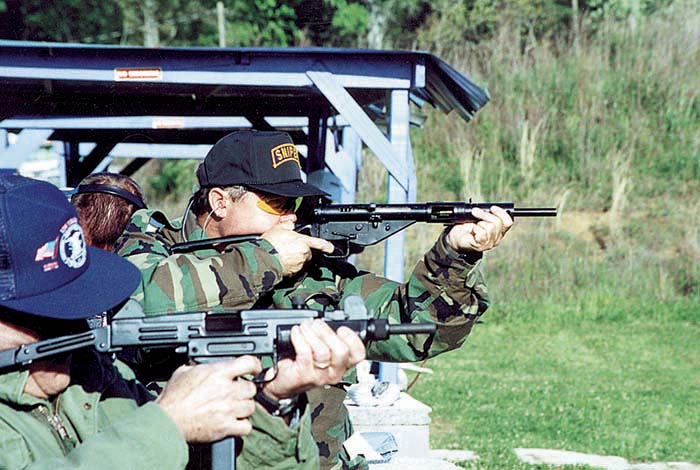
Eighteen competitors from six states assembled by noon on Saturday. Seven came from Mississippi, five from Alabama, three from Texas, and one each from Louisiana, Georgia, and Florida. As though the sheer fun of jumping out of an airplane and shooting a rifle, handgun, shotgun, and submachine gun was not gratification enough, twenty parachute and firearms companies generously donated more than $6,000 in prizes and freebies to supplement the 1st and 2nd place trophies and a perpetual plaque that were awarded.
There were five events: one skydiving and four shooting. Because of unusually high winds on Saturday, the jumping was postponed until Sunday morning. The shooting events ran simultaneously from 1 to 5pm on Saturday. Competition was finished by noon on Sunday. All of the events included a timed element. The maximum amount of time allowed in any event was 2 minutes. The competitors were ranked according to the total amount of time in which they completed all five events. Winner and Second Place trophies were awarded to the two competitors who completed the events in the least amount of time. The winner’s name was inscribed on a perpetual plaque that remained with Sherman Hill Public Shooting Center. The prizes also were determined by rank with the competitor finishing the competition in the least amount of time having first choice, the second ranked competitor having second choice, and continuing until all prizes were awarded. The competitors were encouraged to make fun jumps whenever they were not competing. T.K. Donle from DeLand, Florida was our overall winner finishing first in two events and completing two of the other three events without receiving a time penalty. T.K. unseated Chuck Davis from Grace, Mississippi who had won the first three Chute ‘N Shoots. Chuck finished Second, and Jim Cazer from Talladega, Alabama finished Third.
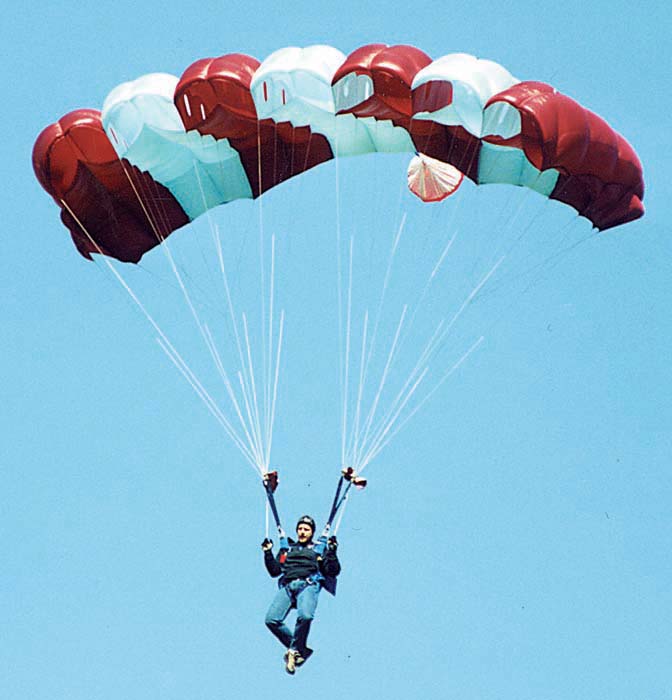
For the PARACHUTING EVENT competitors jumped from a Cessna 182 at an altitude of 3,500’ and attempted to land on a target within a 30’ circle. A time penalty was assessed based on the distance the competitor landed from the 5’ center of the circle. Competitors were allowed two jumps, keeping the better of the two. If a competitor landed within the 5’ circle on the first jump, he was not allowed a second. A scoring chart can be found at the end of this article.
Parachuting gear had to have an in-date reserve and was checked prior to the jump. All competitors had to show proof of possession of a United States Parachute Association D (Master) license. Because Sherman Hill is located on Interstate 20, and because of the many obstacles such as range sheds, berms, and power lines, it was necessary to require that each competitor possessed the highest sport license offered by the United States Parachute Association. Fun jumps were allowed at the jumper’s expense so long as they did not interfere with the competition. The pilot was Roy Sims from Durant, MS. The Parachute Judge was Jim Cazer, Talladega, AL.
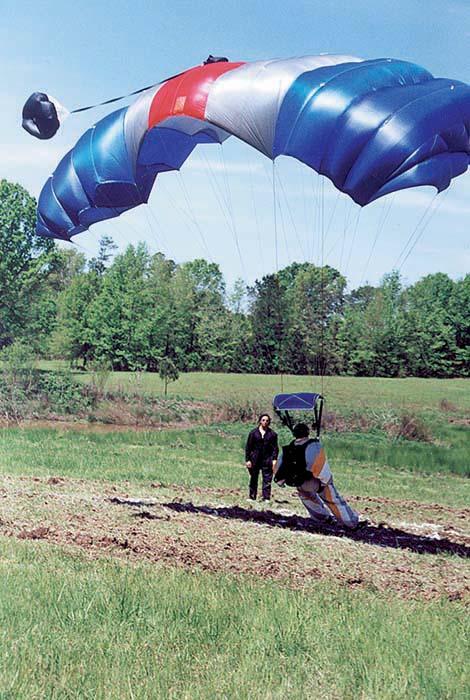
The HANDGUN EVENT allowed any centerfire handgun with iron sights; any ammunition except magnum, armor piercing, and tracer; any amount of ammunition; and any number of pre-filled speed loaders or magazines. The competitor was allowed a one-minute preparation period during which time the handgun could be loaded. There was no maximum number of rounds that could be loaded or fired. The competitor had to fire from a standing, unsupported position.
At the end of the preparation period and after receiving a “Ready” from the competitor, the Range Officer commanded “Fire” and punched a stopwatch. The targets were six steel pepper poppers placed from 10 to 25 meters from the firing line. When the sixth pepper popper was hit, or when 120 seconds had elapsed, the Range Officer commanded “Cease Fire” and recorded the competitor’s elapsed time in seconds. If a competitor fired early or late, that competitor received the maximum time penalty of 120 seconds. In past years we had required the pepper poppers to be knocked over, but 20 to 30 mph wind which tended to blow the poppers over, coupled with the desires of most of the competitors, allowed a hit to equal a fall. The Range Officer was Eric Anderson, Brandon, MS.
The RIFLE EVENT allowed any centerfire rifle except selective fire; any sight; any caliber under .50; any type of ammunition except armor piercing and tracer; and any amount of ammunition pre-loaded in magazines or clips. The competitor was allowed a one-minute preparation period during which time the rifle could be loaded. There was no maximum number of rounds that could be loaded or fired. The competitor had to fire from a standing, unsupported position.
At the end of the preparation period and after receiving a “Ready” from the competitor, the Range Officer commanded “Fire” and started a stopwatch. The targets were one-gallon milk jugs filled with water at 40, 80, and 120 yards, and a reactive silhouette pop-up target at 140 yards. The competitor had to hit one jug at each of the three distances and the silhouette. When the silhouette fell, or when 120 seconds had elapsed, the Range Officer commanded “Cease Fire” and recorded the competitor’s elapsed time in seconds. If a competitor fired early or late, he received the maximum penalty of 120 seconds. John McCoy, Pearl, MS was the Range Officer.
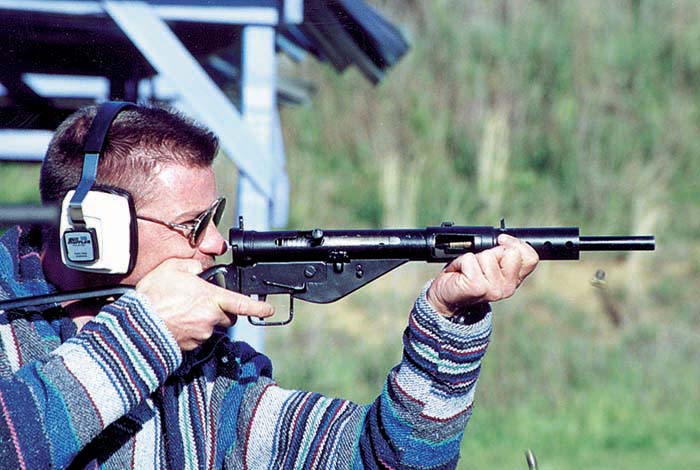
The SHOTGUN EVENT allowed any gauge and any type of shotgun with any size and type of birdshot except tracer. The competitor was allowed a one-minute preparation period during which time the shotgun could be loaded with one shell. The competitor was limited to 15 shells and had to fire from a standing, unsupported position.
At the end of the preparation period and after the shotgun was loaded and held with the muzzle high and the butt low, the competitor yelled “Pull” and a single clay target was thrown across his front. A clay was thrown only at the competitor’s command and only when the shotgun was held muzzle high and butt low. The competitor was allowed to load only one shell for each clay. The competitor’s time was determined by the number of shells used to hit five, single clay targets. If a competitor fired when a clay was not in the air, that competitor would receive the maximum time penalty of 120 seconds. The Range Officer was Eldon Harralson, Lawrence, MS.
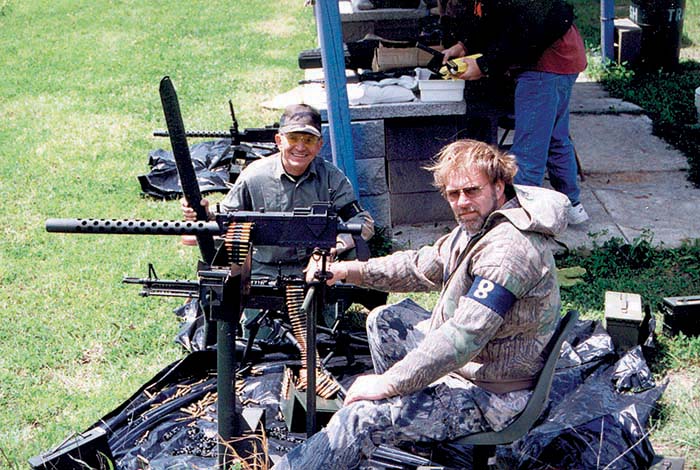
The SUBMACHINE GUN EVENT generated as much interest as the parachuting. Almost half of our competitors had never fired a fully automatic firearm before. Competitors were allowed to load a 30 round magazine into the SMG during the one-minute preparation period. They were limited to two, 30-round magazines. The targets were water-filled, one-gallon milk jugs, one each at 10, 15, 20, 25, 30, and 35 yards, and a reactive, pop-up silhouette at 50 yards. Competitors were required to fire full-auto, meaning more than one round per burst, from a standing, unsupported position. If only one round was fired and if that bullet hit a target, the competitor was scored a miss unless that was the last shot fired from that magazine.
At the end of the preparation period and when the competitor said “Ready” the Range Officer commanded “Fire.” When all seven water jugs had been hit, the silhouette target appeared. When it was hit or when 60 rounds had been fired, the Range Officer commanded “Cease Fire. Any remaining targets were counted as a miss. If a competitor fired early, he was assessed a time penalty of 120 seconds. The Range Officer was John McCoy, Pearl, MS.
The submachine guns were Uzis and Stens provided by Storrie Parachute Works, 215 East Hickory Street, Denton, TX 76201, 1-800-928-0157.
Almost as much fun as the competition was the opportunity to shoot machine guns which were made available by enthusiasts who did not compete. Some of the firearms on hand included an American 180 in .22 Long Rifle, two MP5s, an M1 Thompson, two 1919A4s, an Uzi, an M60, and an M16. The owners of these beauties kindly allowed those who were interested (especially the ladies) to fire them. What a pleasure to see everyone having such a good time with firearms.
Saturday night brought forth a special treat: a seafood buffet at the Back Forty Seafood Restaurant at Lake, Mississippi, not far from Sherman Hill.
The following is a list of the competitors who either won or finished an event without receiving a time penalty:
PARACHUTE
Vern Melancon, New Iberia, LA
T.K. Donle, DeLand, FL
Bill Schmitt, Dallas, TX
Al Alexander, Allen, TX
Chuck Davis, Grace, MS
HANDGUN
T.K. Donle, DeLand, FL
RIFLE
T.K. Donle, DeLand, FL
SHOTGUN
Larry Stapleton, Flowood, MS
Richard Hill, Pelahatchie, MS
Clyde Morgan, Brandon, MS
Pete Certain, Huntsville, AL
David Cazer, Harvest, AL
Steve Thompson, Amory, MS
Jim Cazer, Talladega, AL
Chuck Davis, Grace, MS
Frank Hill, Worthy, AL
SUBMACHINE GUN
Clyde Morgan, Brandon, MS
T.K. Donle, DeLand, FL
Bill Schmitt, Dallas, TX
Al Alexander, Allen, TX
John Storrie, Denton, TX
Steve Thompson, Amory, MS
Jim Cazer, Talladega, AL
Howard Stetson, Huntsville, AL
Frank Fowler, Hattiesburg, MS
The Chair of our Sponsorship Committee, the person who did the most work in making C’NS 2000 so successful, was Al Alexander, Allen, TX. Some of the competitors received as many as three prizes. All received at least two. The following is a list of the companies who sponsored the C’NS with their fine products:
ACME Rigging, 112 Deer Trail, Brandon, MS 39042, 601/825-4616.
Bev Suits, 2746 Bleiler Road, New Tripoli, PA 18066, 610/285-6994.
Cazer Para Loft, 589 East Lake Hill Drive, Talladega, AL 35160, 256/268-9843.
Cummings Rigging Works, 15 Gaynor Avenue, Manhasset, NY ll030, 516/627-1432.
Decot Hy-Wyd, PO Box 15830, Phoenix, AZ 85060, 1-800-528-1901.
DeSantis Holster & Leather Goods, 149 Denton Ave, New Hyde Park, NY 11040, 516/354-8000
Flite Suite, 24390 Aviation Avenue, Davis, CA 95616, 530/753-1516.
Hoppe’s, Airport Industrial Mall, Coatesville, PA 19320
Jumper Sportswear, 221 North Main, Suite 100, Wichita, KS 67202, 1-888-558-6737.
Kroop’s Goggles, Dept. P, 9865-E N. Washington Blvd., Laurel, MD 20707, 301/498-5848.
Para Gear Equipment Co, 3839 West Oakton St, Skokie, IL 60076, 847/679-5905.
Para Publishing, PO Box 8206, Santa Barbara, CA 93118, 805/968-7277.
Performance Designs, 1300 East Int’l Speedway Blvd, DeLand, FL 32724, 904/738-2224
RelativeWorkshop,1545 Lexington Avenue, DeLand, FL 32724.
Skydiving Magazine, 1725 North Lexington Avenue, DeLand, FL 32724
Storrie Parachute Works, 215 East Hickory Street, Denton, TX 76201, 1-800-928-0157.
Sun Path Products, 4439 Skydive Lane, Zephyrhills, FL 33540, 813/782-9242.
Sunrise Rigging, 38529 5th Avenue, Zephyrhills, FL 33540, 813/788-1910.
West Tennessee Skydiving, 441 Sweet Apple Cove, Apt. 7, Collierville, TN 38017, 901/854-8780
Next year’s Chute ‘N Shoot is scheduled for Saturday and Sunday, April 7th and 8th, 200l. Competitors will be limited to the first 30 with a USPA D license who pre-register. Entrance fee is $50. There will be trophies for 1st, 2nd, and 3rd place. Fun jumps by D license holders will be allowed. Point of contact is Clyde H. Morgan, 66 Glenway Place, Brandon, MS 39042, 601/825-3971.
Come to think of it, given the number and types of firearms present, the amount of ammunition, and the abilities of our competitors, it is probably just as well we weren’t 134 years back in time. I don’t think that the General and his bluebellies would have even made it out of Tuscalameta Swamp, much less all the way to Meridian.
| This article first appeared in Small Arms Review V3N12 (September 2000) |



